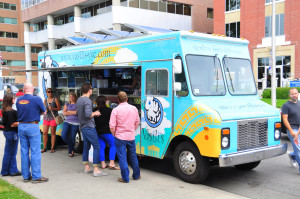 Serving everything from basic sandwiches and snacks to gourmet fare, food trucks are a big deal these days. By some estimates, three million food trucks and more than five million food carts currently operate in the U.S. There’s even a reality television show called “The Great Food Truck Race,” which focuses on the trials and tribulations of starting and growing a food truck business. Using POS systems is one way food truck operators can set themselves up for success. Here’s why:
Serving everything from basic sandwiches and snacks to gourmet fare, food trucks are a big deal these days. By some estimates, three million food trucks and more than five million food carts currently operate in the U.S. There’s even a reality television show called “The Great Food Truck Race,” which focuses on the trials and tribulations of starting and growing a food truck business. Using POS systems is one way food truck operators can set themselves up for success. Here’s why:
1. POS systems pave the way for expanding the customer base, in turn boosting sales. About 72 percent of food trucks still accept only cash, forcing operators to turn away customers who would be happy to patronize their business if paying by debit or credit card were an option. With mobile or traditional stationery POS systems in place, food truck operators can accept payments made with either type of card, cultivating more customers and generating more business in the bargain.
2. POS systems facilitate sales and cash tracking. Keeping tabs on sales and cash can be difficult when using a traditional electronic cash register. POS systems automatically capture this information, simplifying the tracking process. Food truck operators can also leverage their POS systems to generate reports that provide breakdowns of sales by item, time of day, and location (different sites for one truck or sales per item, per truck for businesses with multiple vehicles). This data can then be used to adjust menus according to identified customer preferences and other trends.
3. POS systems enable tight inventory control. Most, if not all, POS systems have inventory management modules that permit food truck operators to keep tabs on ingredient usage; many also allow users to set minimum inventory levels and trigger re-orders when necessary. Having such information available makes it possible to determine the quantity of each ingredient that should be stocked in the trucks daily. It also ensures that the right ingredients – in the right quantities – will be on hand when they are needed, preventing product shortages and minimizing the risk of losing customers because their favorite menu items are not being served on a given day.
4. POS systems make the order-taking process smoother and more accurate. A majority of mobile and traditional POS systems designed for use in food trucks are touchscreen-based. Instead of manually recording orders or trying to commit them to memory—increasing the risk of food preparation mistakes and potentially adding to the amount of time customers must wait to place orders—food truck operators need only tap the touchscreen to accept orders. The end-result is enhanced efficiencies and a higher level of customer satisfaction.
5. POS systems make inexpensive marketing and promotion initiatives a reality. Often, all it takes for a food truck to attract customers is letting them know where the vehicle is parked at a particular time or that a special deal is available. Many POS systems give food truck operators the capability of Tweeting out such information and/or posting it to a Facebook or other social networking page.
Just as there are several reasons food trucks should use POS systems, there are multiple types of systems available. Mobile POS systems that operate on such devices as tablets have become more popular in recent years. These solutions offer the advantage of complete portability, without cabling and wires to worry about. For food truck operators that prefer more traditional, static POS systems, there are small footprint options that allow for installation in cramped quarters. But whether they opt for a mobile or traditional configuration, today’s operators must have POS systems in their equipment arsenal if they are to fully capitalize on the growing food truck trend.






